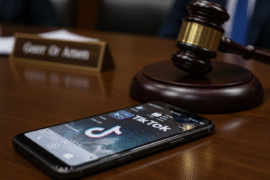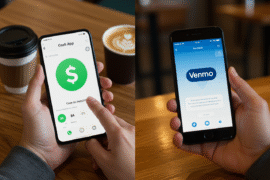This article may contain references to products or services from one or more of our advertisers or partners. We may receive compensation when you click on links to those products or services. Nonetheless, our opinions are our own.
- Key Highlights
- Introduction
- Identity Theft Protection in 2025
- The Growing Importance of Digital Security
- Key Features of Identity Theft Protection Services
- Getting Started with Aura and LifeLock
- What You Need to Know Before Choosing a Service
- Equipment and Resources for Optimal Protection
- Guide to Choosing Between Aura and LifeLock
- Feature Comparison Chart
- Deep Dive into Aura’s Offerings
- Exploring LifeLock’s Services
- Conclusion
- Frequently Asked Questions
- Recommended Reads
Key Highlights
- Aura and LifeLock are both well-known in the world of digital security for their identity theft protection services. They offer various features to help safeguard your personal data.
- Aura stands out by including antivirus software, a Virtual Private Network (VPN), and credit monitoring from all three bureaus in every plan.
- LifeLock provides multiple plan options, allowing you to adjust coverage based on your needs. However, it is more expensive, particularly for renewals.
- Regarding user experience, Aura is often praised for its user-friendly interface and seamless setup across multiple devices.
- The best choice will depend on your specific needs and budget. Aura is ideal for those who want comprehensive coverage, while LifeLock offers flexibility through its multiple plan tiers.
Introduction
In today’s digital age, protecting your identity is more important than ever. Services like Aura and LifeLock offer robust digital security to help keep your personal information safe. With these tools, both individuals and families can enjoy peace of mind. However, choosing the right service can be challenging, as each has unique features and pricing structures. This guide will help you understand the key differences between Aura and LifeLock in 2025 to decide on identity theft protection.
Identity Theft Protection in 2025
Identity theft protection has evolved significantly to address the increasing sophistication of cybercrime. Personal data is now more accessible online, making it crucial to go beyond basic credit score monitoring.
Today’s identity theft protection services act as digital safeguards, scanning online sources for signs that your personal information has been compromised. These services monitor areas like the dark web, financial transactions, and even social media to detect potential fraud early, providing comprehensive protection.
As cybercriminals become more advanced, identity theft protection is not just a luxury—it’s a necessity. Reliable services help guard your personal data and give you the confidence to navigate the digital world without constant fear of theft.
The Growing Importance of Digital Security
Our lives are more interconnected with the digital world than ever before. We shop, bank, and connect with others online, making life easier and exposing us to greater risks. Our personal information is more vulnerable to cybercriminals, and recovering from identity theft can be a long, frustrating process.
This is where digital security comes in. Think of it as a bodyguard for your online identity, protecting your data from hackers and criminals on the dark web. With trusted services like Aura and LifeLock, you can take steps to protect your personal information and avoid the hassle of identity theft recovery.
Digital security is essential for everyone today. Reliable antivirus software, password managers, and services like Aura and LifeLock make protecting sensitive information easier, and enjoy the peace of mind you deserve.
Key Features of Identity Theft Protection Services
When choosing an identity theft protection service, it’s crucial to understand the core features that will keep you safe online. These are not optional perks—they’re essential tools that can help you prevent fraud.
One of the most important features is credit monitoring, which acts as a personal guard for your credit report. It alerts you to suspicious activity, such as new accounts or inquiries you didn’t allow. This early detection can help stop identity theft before it causes major damage.
Many services also provide password managers to help protect your login credentials, making it more difficult for hackers to gain access. The dark web and social media monitoring are valuable tools to safeguard your identity in today’s connected world.
Getting Started with Aura and LifeLock
Both Aura and LifeLock offer easy sign-up processes for identity theft protection. Aura’s setup is simple and intuitive, while LifeLock may require more detailed information upfront.
Regardless of your chosen service, expert support is available at every step. Both companies offer reliable customer support and resources to guide you through the setup process and answer questions.
What You Need to Know Before Choosing a Service
Before selecting a service, take a moment to evaluate your specific needs. Identity theft protection isn’t one-size-fits-all—what works for one person may not work for another.
First, assess the level of risk you’re comfortable with. Do you need basic credit monitoring, or are you seeking more comprehensive protection, such as dark web monitoring and social media alerts?
Next, review the pricing structure carefully. Some services, like LifeLock, may increase in price after the initial subscription period, so it’s important to factor in long-term costs.
Finally, ensure that the service offers responsive customer support, especially if you need help with an issue. Fast and effective customer service is crucial for resolving any problems quickly.
Equipment and Resources for Optimal Protection
Using an identity theft protection service is a successful first step, but the right tools can further enhance your security.
Ensure your devices have reliable antivirus software to protect you from malware and scams. Consider using a VPN to safeguard your internet traffic, especially when connecting to public Wi-Fi.
If you have children, setting up parental controls is essential to ensure online safety. Parental controls can block harmful content and limit access to unsafe websites, providing additional protection for your family.
Guide to Choosing Between Aura and LifeLock
Choosing between Aura and LifeLock doesn’t have to be difficult. Here’s a clear guide to help you find the best identity theft protection solution:
Step 1: Assess Your Security Needs
Think about your digital habits and the types of information you need to protect. Are you concerned about credit fraud or need more comprehensive protection, including antivirus software or VPN services?
Knowing your specific needs will help you choose the right plan. Don’t just go for the service with the most features—pick the one that best matches your lifestyle.
Step 2: Compare Features
Look at what each service offers. Aura includes antivirus and VPN in all its plans, making it a sound choice for people who want all-around protection. LifeLock provides a variety of plans with extra features available at higher tiers.
Step 3: Read Customer Reviews
Customer reviews can provide insights into how well each service works in real life. Look for feedback on the effectiveness of their monitoring tools, customer support, and overall satisfaction.
Step 4: Understand Pricing and Plans
Both Aura and LifeLock offer original plans based on your needs. Compare the pricing carefully and account for potential renewal rate increases. Check if the features you want are included in your chosen plan or if you must pay extra.
Feature Comparison Chart
| Feature | Aura | LifeLock |
|---|---|---|
| Credit Monitoring | All three bureaus included in all plans | One bureau in basic plans; three bureaus in premium plans |
| Identity Theft Insurance | Up to $1 million per adult | Up to $1-3 million depending on the plan |
| Digital Security Tools | Antivirus, VPN included in all plans | Available as an add-on or in premium plans |
| Family Plan | Up to 5 adults, unlimited children | 2 adults, 5 children |
Deep Dive into Aura’s Offerings
Aura offers a well-rounded identity theft protection service that is easy to use and provides complete coverage. Aura covers everything, whether you need credit monitoring or comprehensive digital security.
Aura’s unique advantage is its inclusion of antivirus software and a VPN in all plans, ensuring your digital identity and devices are well-protected from various threats. Its user-friendly platform and mobile apps make it simple to manage your protection from anywhere.
Pros and Cons of Choosing Aura
Pros:
- Comprehensive protection with antivirus, VPN, and credit monitoring in all plans.
- Easy-to-use interface and simple setup.
- Strong privacy protections.
Cons:
- Limited options for customizing coverage.
- There’s always a slight risk when sharing personal information with any third-party service.
Exploring LifeLock’s Services
LifeLock, known for its identity theft protection since 2005, offers several plans that can be tailored to fit different needs. Partnering with Norton 360, LifeLock combines identity theft monitoring with robust antivirus protection, creating a powerful tool for safeguarding your information.
LifeLock’s plans are versatile, offering everything from basic credit monitoring to comprehensive protection for families and individuals.
Key Advantages of LifeLock
- Works with Norton 360 for enhanced protection.
- Multiple plans offer flexibility to match your needs.
- Extensive monitoring of credit, public records, and the dark web.
LifeLock’s Limitations
- Complex pricing structure that can confuse users.
- Plans are more expensive, especially when renewing.
Conclusion
Both Aura and LifeLock are excellent choices for identity theft protection in 2025. By weighing your security needs, reviewing the features of each service, and comparing customer feedback, you can choose the service that best fits your needs. Aura offers a more streamlined, all-in-one solution, while LifeLock provides flexibility with its range of plans. Consider your priorities—whether its comprehensive protection or the ability to customize your coverage—and make an informed decision to keep your identity safe.
Frequently Asked Questions
Which service offers better coverage for families, Aura or LifeLock?
Aura is the best choice for family coverage, as its family plan includes protection for up to five adults and unlimited children.
What are the key features of Aura identity protection services?
In every plan, Aura offers credit monitoring, a password manager, antivirus software, a VPN, and dark web monitoring.
What sets LifeLock apart from other identity theft protection services?
LifeLock’s partnership with Norton 360 provides identity theft protection and robust antivirus security, making it a successful option for those seeking an all-encompassing solution.

Reviewed and edited by Albert Fang.
See a typo or want to suggest an edit/revision to the content? Use the contact us form to provide feedback.
At FangWallet, we value editorial integrity and open collaboration in curating quality content for readers to enjoy. Much appreciated for the assist.
Did you like our article and find it insightful? We encourage sharing the article link with family and friends to benefit as well - better yet, sharing on social media. Thank you for the support! 🍉
Article Title: Aura vs. Lifelock Review: Understanding the Key Differences in 2025
https://fangwallet.com/2024/11/29/aura-vs-lifelock/The FangWallet Promise
FangWallet is an editorially independent resource - founded on breaking down challenging financial concepts for anyone to understand since 2014. While we adhere to editorial integrity, note that this post may contain references to products from our partners.
The FangWallet promise is always to have your best interest in mind and be transparent and honest about the financial picture.
Become an Insider

Subscribe to get a free daily budget planner printable to help get your money on track!
Make passive money the right way. No spam.
Editorial Disclaimer: The editorial content on this page is not provided by any of the companies mentioned. The opinions expressed here are the author's alone.
The content of this website is for informational purposes only and does not represent investment advice, or an offer or solicitation to buy or sell any security, investment, or product. Investors are encouraged to do their own due diligence, and, if necessary, consult professional advising before making any investment decisions. Investing involves a high degree of risk, and financial losses may occur including the potential loss of principal.
Source Citation References:
+ Inspo












































